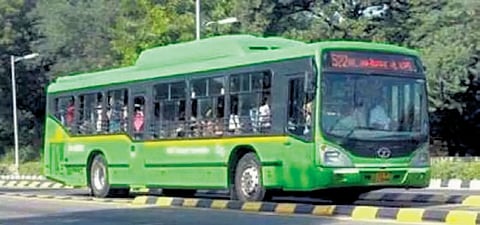Women mobility up after free fare bus service in Delhi
NEW DELHI: Delhi government’s free bus ride scheme for women have increased their mobility, helped them save transport costs and redirect the expenses on health and other household expenses. On the flip side, a majority of women feel unsafe in the buses, with a section of them saying they are often insulted by men for travelling on free tickets.
These are the findings of the report, ‘Riding the Justice Route: Free Bus Travel as a Step Towards Gender — Just Public Transport in Delhi’ released by Greenpeace India, a non-profit environmental campaign organisation.
The report evaluated the transformative impact of Delhi’s Fare Free Bus scheme for women launched in October 2019. The scheme allows women to travel fare-free in all AC and non-AC buses operated by the Delhi Transport Corporation and Delhi Integrated Multimodal Transport System using ‘pink ticket,’ a single-journey free travel pass.
The policy has achieved a milestone, as DTC issued over 100 crore pink tickets by 2024.
The report brought to fore some interesting finds: Around a quarter of women have started regular bus travel, and around 15% new women have started taking bus journeys.
About 75% of women have seen a drop in monthly transport costs, with many now spending less than Rs 1,000. The savings are being redirected — 54% to household expenses and 50% to emergency funds.
The report has also underlined positive perceptions about the scheme, as 88% of women believed the scheme has enhanced bus usage, while 87% appreciate the reduced need to walk long distances.
However, it also underlined several persisting challenges of public transport and the current scheme. It said that 14% of low-income women reported facing insults from male passengers, while 77% of women felt unsafe when using buses after 5 pm due to poor lighting and bus frequency, with many experiencing harassment while travelling or waiting for buses.
The report explained the situation where women were more vulnerable in Delhi’s public transport. “When the bus halts at the stop, people rush to board the bus. Women say men take this as an opportunity to push, touch, grope or lean on them,” the report mentioned.
This kind of harassment continues inside the bus. The women who travel standing are often the victims as buses are overcrowded, it said.
“While the impact of the scheme is undeniable, we must also ask why it remains inaccessible to many women, especially those from marginalised groups,” asked Archana Singh, who authored the report.

